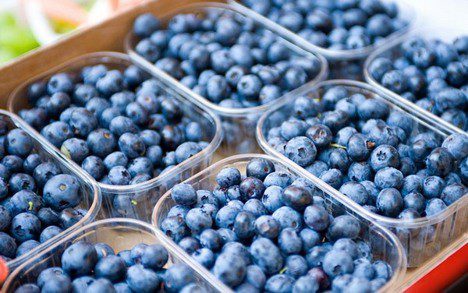
Justin Mudge, blueberry farmer and chair of the board of BerriesZA for the past four years, believes that a stratified berry industry has been gathered together by BerriesZA, coalescing around common problems like the chemical application and registration process. This he says, is an absolute struggle or the status quo at South Africa’s ports, of which he has been an outspoken critic.
“Undoubtedly we face a massive collective challenge. Something like the port strike last year, where I was particularly vocal, also created more of a common understanding that you need a mouthpiece for industry and you can’t do this alone, “said Justin.
Elzette Schutte, operational manager of BerriesZA explains: “There has not been a real change in the number of blueberry growers, but we experienced an increase in the associated membership, with more exporters and nurseries joining the industry.”
Chinese blueberry import needs
In 5 years the total Chinese blueberry needs far exceed the entire South African crop.Therefore, the industry hopes to have India and Israel open to them during the season ahead.
“Market access is such a slow-burning fuse,” Justin remarks, “but we are getting good support and working well with the Department of Agriculture, Land Reform and Rural Development.”
China is the market we really want opened: the country is predicting a need for 10,000 containers of blueberries a year out of the Southern Hemisphere in five years’ time. “That equates to 10 x the current South African exports,” he says.
“If we continue on the current route [of no access into China] that opportunity will pass us by and those blueberries will be produced elsewhere in the Southern Hemisphere and South Africa will allow others to effectively eat our lunch.”
More price mechanisms required
Everyone planted everything everywhere, with very little predictor of success, Justin explains, and the industry has seen a lot of casualties through varieties that didn’t perform in certain regions or routes to market that were not well understood.
Only those at the top end of efficiency thrive, which is why South Africa has to be more focused about how their fruit is marketed into Europe.
“I would say because of the traditional stratification there is an overconcentration of marketing avenues through too few channels into Europe. We need to recognize that Europe is diverse and requires a diversity of supply chains to service their individual requirements.”
He explains that production surges, especially of highly perishable products like blueberries, require a mechanism with which to flush them through the market, but that has been missing.

Blueberries across the border
Namibia and Zimbabwe have emerged as blueberry growers in tandem with South Africa and the potential for overlap is there, but relative to the overlap with their Peruvian counterparts, it’s insignificant and should be no issues if product is positioned well.
“Wider supply from Southern Africa is a positive in my view; it targets the region as a production area with a wide range of availability. Zimbabwean supply is kicking off even now. It gives us a long reach. We’re actively engaging with Namibia and Zimbabwe to at least understand how we can cooperate on issues of common interest and share information.”
An area of common interest is the in-efficiency at South African ports, and Justin tells of the heavy traffic of ships rounding the Cape of Good Hope, but bypassing ports which have become known for its unjustified delays.
Nevertheless, he maintains that there is a real and present opportunity for berry farming in South Africa.
“The contextual environment in which growers operate, will ultimately determine whether we’re able to seize the opportunity or not. What producers are asking for is an opportunity for leverage and to seize their rightful place in the market,” concluded Mudge.
Source: Berries ZA (Original text written by Carolize Jansen for Fresh Plaza.

